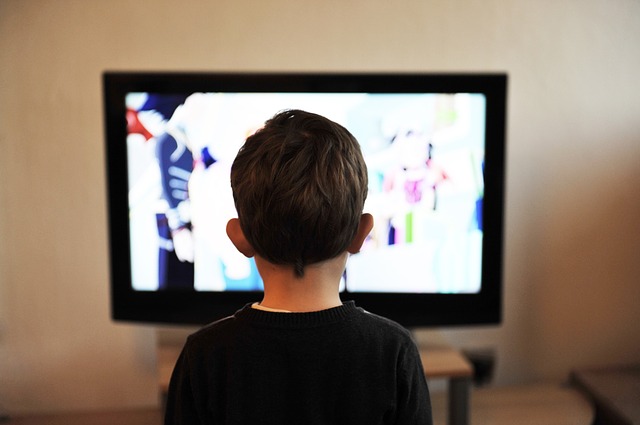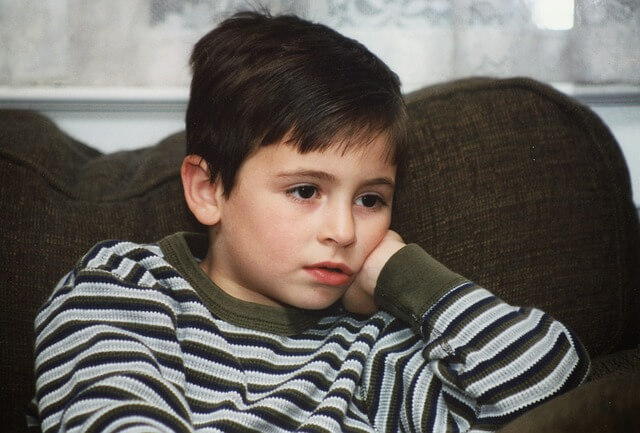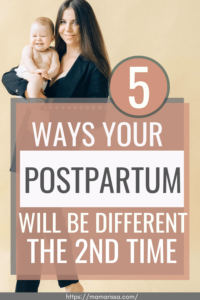Your cart is currently empty!
Screen Viewing Effects on Children
We live in the age of technology – screens are everywhere. At this point, electronic devices are so prevalent, most of us literally cannot function without them at home, work or play. But with so many screens everywhere, as a mom, I can’t help but be concerned about how this might effect my child’s health.
I do not currently allow my toddler daughter any screen viewing time generally. But as my husband recently reminded me, it would be a huge problem for her to be electronically illiterate as she gets older. At some point, it will be necessary for her to learn how to interact with technology. But how much screen viewing time is okay at what age and how does it effect various aspects of children’s health? I’ve done some digging to get some answers.

Effects on Physical Health
It turns out, screen viewing, particularly on portable electronic devices, has a negative effect on the amount of sleep children of all ages get, but more so in children under the age of ten (Source). Screen viewing has also been proven to decrease sleep duration specifically in babies and toddlers, most notably in babies 6 months and younger (Source).
Since sleep is an incredibly important aspect of babies’ and kids’ lives – for mental, emotional and physical development – lack of sleep is a big deal if it’s happening over an extended period of time.
Another important consequence of children’s screen viewing is obesity. Some obesity, in both children and adults, has been linked to excessive TV watching as a child. One study conducted in New Zealand attributed 17% of the obesity in 26 year olds to watching TV for more than 2 hours per day during childhood and adolescence (Source).
Experimental studies have also shown a significant decrease in children’s caloric intake and weight gain when screen time is cut down. Interestingly, studies have not produced a strong association between less screen time and increased physical activity among children (Source).
The predominant factor that has been shown to contribute to screen viewing-related childhood obesity is unhealthy dietary choices. Excessive screen viewing causes children to eat more foods with high calories and less nutrition.

This may be partially due to screen entertainment distracting from feelings of fullness as well as advertisements for restaurants, snacks, and beverages creating desire for foods that are not needed by the body. Lack of sleep also contributes to increased appetite (Source) which is probably why regular sleep deprivation has been linked to childhood obesity (Source).
Effects on Mental Health
You may have heard about the groundbreaking new study that is being done by the National Institutes of Health funded by the Federal Government examining the long term effects of screen viewing on children (around age 10) over the course of ten years.
60 Minutes investigated some preliminary results from the study. There are some potentially alarming implications for our kids, including indications that part of the brain (the cortex) may be prematurely maturing in children who spend more than 7 hours per day looking at a screen. Researchers have also found that kids who spend more than 2 hours per day looking at a screen score lower on thinking and language tests.
Even scarier than low test scores is the fact that young adults who had higher levels of TV viewing as children and adolescents are much more likely to have a criminal conviction, develop an antisocial personality disorder, and exhibit more aggressive personality characteristics compared to young adults who viewed less TV as children and adolescents (Source).

And there is certainly an abundance of TV watching and other screen time in most kids’ lives. The CDC (Centers for Disease Control) states that children ages 8-10 spend 6 hours per day, 11-14 year olds spend 9 hours per day, and 15-18 year olds spend 7 1/2 hours per day looking at entertainment media on a screen. Those hours do not include educational screen time for school.
Those numbers are staggering! When are our kids sleeping, socializing, and getting exercise? The only answer I can come up with is: They’re not. No wonder they are scoring lower on thinking and language skills!
Most of us are already aware that today’s youth spends too much time in the virtual world. But what about allowing your infant/toddler/preschooler limited amounts of screen time with educational apps and programs to encourage their cognitive and language development?
Dr. Dimitri Christakis of Seattle’s Children’s Hospital and the lead author of the APP’s most recent screen time recommendations told 60 Minutes that babies cannot learn from technological devices; a baby who learns to stack blocks on an IPad app cannot practice the same thing with physical blocks because they cannot transfer their virtual knowledge to real life.

Likewise, an article published in Pediatrics states that babies and toddlers under age 2 cannot comprehend TV programming directed at children. Kids this young learn much more from an actual situation happening in front of them than they do from an equivalent TV program demonstrating the same thing.
Another article similarly concluded from a study of 872 children that TV viewing as an infant (age 0-2) had no effect on their language or visual motor skills at age 3. This indicates that it might not be harmful to babies’ and toddlers’ cognitive development to have some screen time, but there is no known benefit to introducing technological devices this early.
However, according to the previously mentioned article in Pediatrics, for preschool-age children, there may be some benefit to viewing educational programming. Watching shows such as Sesame Street has been associated with better social behaviors in preschoolers as well as higher quality academic performance which, incredibly, follows them all the way through high school!

The article also notes that while interaction is reduced when parents watch children’s programming with their infant, parents’ vocabulary with their infant is richer immediately afterward. This could have a positive impact on babies as they are learning to talk, but the key is that you must be viewing with your child, not just setting them in front of the TV while you get something done. The benefit here comes from the child receiving what the parent has learned rather than directly gleaning from the program itself.
How Much and When is it Okay?
So the effects of screen viewing on children have both positive and negative sides. When deciding on rules and boundaries for our kids’ screen time, the key things to focus on are the types of media being viewed (educational vs. entertainment), the age of the child (is the child developmentally capable of learning from what he/she is viewing), and the amount of viewing time per day.
For younger children, the AAP (American Association of Pediatrics) recommends focusing on physical playtime for babies and toddlers and using only educational media with young children 18 months and older. Between ages 2 and 5, screen time should not exceed one hour per day and needs to involve the parent who can help their child learn from educational programs.
As children get older (school-age), the AAP emphasis it is important to limit media use and create a balance wherein other healthy life activities are not neglected as a result of too much media time. They also encourage parents to have boundaries as to when and where media can be used. For children ages 10-18, the CDC recommends no more than 1-2 hours of total screen time per day.

My Thoughts
Please note that all this information is just that – information. It is not my intention to make any mom feel guilty because her young child watched two hours of television yesterday. I wrote this post because I wanted to do the research for my own benefit, and I hope it will be a benefit to other moms as well.
But all of us mamas have to take a sick day once in a while, get some grubby little fingernails clipped, or sneak some medicine into a nursing session and sometimes a screen is the only distraction strong enough for the job.
Ultimately, we all have our children’s best interest at heart, and we are all figuring out what is best for each individual child. It’s okay if we do things differently!

11 responses to “Screen Viewing Effects on Children”
[…] Read about how screens effect children in this post […]
[…] youngsters are prone to injuries – read this post on how to know when a head injury is […]
[…] When I was a kid, I loved listening to episodes of various kids Christian radio shows. I loved being able to imagine the story as it developed. Listening to audio shows might sound outdated, but it’s a great option for educational and imaginative entertainment without a screen. […]
[…] As your little one gets older, you will either start watching programming directed at your child or you will decrease or eliminate TV time altogether (see my post on Screen Viewing Effects on Children). […]
[…] Read about the effects of screen-time on children here. […]
[…] Find out how too much screen time effects children in this post. […]
I’ve always felt these things in my heart, but have never read any studies to back it up. This was a fantastic read. I hope more people share it. I hope it’s ok, I linked to it in my blog.
I feel the same. Even before I did the research, I just didn’t feel like it was healthy for my baby/toddler to watch TV, even though I couldn’t fully explain why. Reading the evidence on how screen time effects children has confirmed that excessive TV, tablet and phone use is just not good for kids.
It is completely okay and I thank you for sharing my post!
Someone needs spread this message that keep your kids off the screen. And you have penned it down very well. I give minimal to no screen time to my child and i am happy if she gets bored too.
I can see a definite change in my son’s behaviour when he has had too much screen time and the change isn’t a positive change either. As parents it’s so difficult in the age of technology to ensure that your children are fluid in accessing these tools but we definitely need to monitor the amount of time they spend on it also.
Michelle,
You’re right, it is very difficult to find that balance of letting kids learn how to use technology while limiting their use of it. It’s also a challenge to put boundaries on our kids when we ourselves are often looking at a screen. It’s a good reminder for us as parents sometimes to “disconnect” now and then.










Leave a Reply